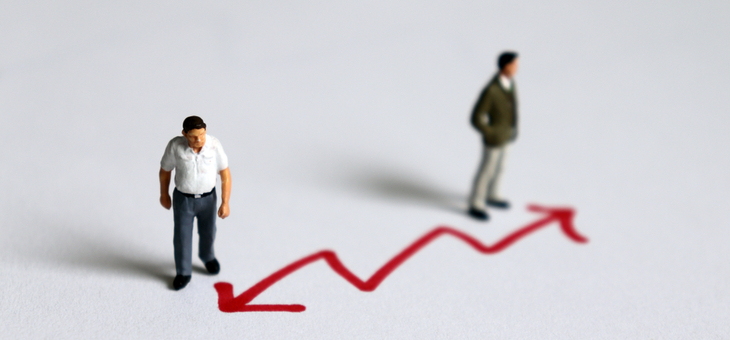Australia’s wealth gap has widened because government spending is biased towards the old and asset prices have risen faster than incomes, says the Mind The Gap report released by Actuaries Australia.
Inequality between generations is at a 20-year high, according to the report.
Lead author Dr Hugh Miller confirmed that millennials (born between 1980 and 1995) are working harder and saving more than their baby boomer parents (born 1946 and 1964). And taking into account financial, environmental and health factors, the ‘youngsters’ are worse off and facing a widening gap, he told the ABC’s PM radio program.
The average young person faced challenges their predecessors did not, such as minimal wage growth and insecure work, he said.
“There are long-term scarring effects from not having good opportunities, so people who do hit the labour market at a time of recession or high unemployment, their incomes will be depressed for many, many years and even decades to come …”
Being hit by the global financial crisis and the coronavirus recession has “significant implications for wealth generation”.
The Actuaries Institute reminds us that millennials will also encounter worsening climate change. That was one factor considered in the analysis of 24 indicators across six domains: economics, housing, health, social, education, and the environment.
The verdict? Today’s young people have significantly better health, education and social outcomes than previous generations of young people, but worse economic, housing and environmental outcomes.
Dr Miller said young people face wage stagnation and rising underemployment, large government net debt and growing pressure on government budgets driven by increased government spending on pensions and healthcare for older households.
The New Daily reports that the share of employed young people actively looking for more work has risen from 12 per cent to 20 per cent over the past decade, but total government spending has remained at roughly 3.5 per cent of GDP on the 25–34 and 45–54 age brackets, and risen from 3.7 per cent of GDP to 4.5 per cent on people aged 65 to 74.
Governments spend $37,750 per capita on people aged 65 to 74 but only $16,250 per capita on people aged 25 to 34.
The home ownership rate among people aged 25 to 34 has fallen from 51 per cent in 2001 to 37 per cent in 2018.
Dr Miller said this was because asset prices were rising faster than wages and record low interest rates had boosted house prices while simultaneously making it harder for people to accumulate savings.
Many commentators believe housing affordability is the chief reason for the intergenerational wealth gap.
ABC business reporter Michael Janda pointed out that 60 per cent of people aged under 35 rent privately, almost none of them own their house outright, many have large debts and few have extensive savings.
They are also more likely to be precariously employed as casuals, contractors or in the gig economy and their industries were hardest hit by the pandemic.
Callum Foote, writing for michaelwest.com.au, says house prices have doubled in the past 20 years.
“This never-to-be-repeated housing boom has contributed to the broadening wealth gap between older and younger generations as boomers have seen the value of their assets skyrocket under them.
“According to the ABS, fewer than half of 25 to 34-year-olds own a home today. If present conditions persist, almost half will remain renters in 40 years’ time.”
In 2019, Grattan Institute experts Brendan Coates and Carmela Chivers agreed, saying income inequality, comparatively, was not particularly high in Australia.
“The real problem is housing inequality. Rising house prices have increased wealth inequality. Rising housing costs have dramatically widened the gap between high and low disposable incomes.
“Incomes for the lowest 20 per cent of households increased by about 27 per cent between 2003 and ’04 and 2015 and ’16. But their incomes after housing costs increased by only about 16 per cent. Low-income Australians are spending much more than they used to keep a roof over their heads.
“In contrast, incomes for the highest 20 per cent of households increased by 36 per cent, and their after-housing incomes by 33 per cent.
“Home ownership is increasingly benefiting the already well-off. Since 2003–04, increasing property values have contributed to the wealth of high-income households increasing by more than 50 per cent. Wealth for low-income households has grown by less than 10 per cent.”
Baby boomer Tony Walker, writing for The Sydney Morning Herald, put it most colourfully.
“The housing boom is the Baby Boomer Klondike. I’m talking about a period of supercharged wealth accumulation that has produced the sort of intergenerational-riches bulge that has distorted the benefits of a record-setting economic expansion to the advantage of one generation and the disadvantage of others. You would be hard put to argue that, if not intergenerational theft, this was not an intergenerational provocation driven by the most favourable giveaway tax regime for an entitled generation in the Western world.
“In other words: generation X, born between 1965–1980; Y, 1981–1996; the so-called millennials; and Z, 1997 onwards, have a rather large point in their criticisms of a protected baby boomer species.”
Demographer Bernard Salt, infamously suggested millennials preferring avocado on toast to saving for a home loan. He says he was taken out of context, but it might all be moot. Because baby boomers are not eternal.
“By the end of the 2020s there will be a significant wealth transfer from the baby boomers to their millennial kids as the baby boomers start to die off.”
Do you believe the young are doing it hard?
If you enjoy our content, don’t keep it to yourself. Share our free eNews with your friends and encourage them to sign up.
Related articles:
https://www.yourlifechoices.com.au/news/lessons-from-parents-that-never-get-old
https://www.yourlifechoices.com.au/news/pension-rule-hurts-retirees
https://www.yourlifechoices.com.au/news/timing-the-share-market–its-hard

